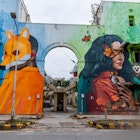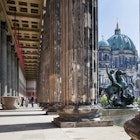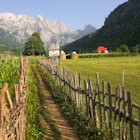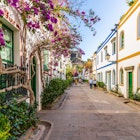
Exploring İstanbul’s hip, historical Fener and Balat neighbourhoods

Mar 16, 2018 • 5 min read

The bustling western shore of Istanbul's Golden Horn © Karl F. Schöfmann / imageBROKER/REX / Shutterstock
Hidden behind the busy road that runs along the western bank of İstanbul’s Golden Horn, the intertwined neighbourhoods of Fener and Balat have a rich history dating back to Byzantine times. These days, past and present mingle in colourful, maze-like streets, where third-wave coffee shops and design boutiques sit next to traditional tea gardens and tradesmen’s workshops.
Here’s a bundle of ways to spend the weekend exploring.

Start with art
A good place for art enthusiasts to begin sating their senses is The Pill, hosting thought-provoking exhibitions since it opened in an old factory in early 2016. At the northern edge of the neighbourhood, Plato Sanat, located inside İstanbul Ayvansaray University, is another beautifully-curated gallery – featuring intriguing student work, Turkish contemporary artists and focusing on original presentation techniques.
A real neighbourhood gem, glass artist Yasemin Aslan Bakiri’s studio, set in a historic stone building by the Bulgarian Iron Church, hosts regular exhibitions and occasional workshops. Architecture aficionados should also keep an eye out for the beautifully restored 15th-century Küçük Mustafa Paşa Hamam, sometimes used as a venue during major art events such as the İstanbul Biennial.

Sip and shop
You could spend all day just cafe-hopping through the neighbourhood, especially since many coffee purveyors double as little shops. Browse for antiques while you sip your java at Maison Balat, or just admire the heirlooms decorating cosy, cat-friendly Cafe Naftalin K. Pick up some stylish coffee cups or a cold-brew infusion bottle at Coffee Department, or peruse the handmade bowls, trays and other wood products at ultra-colourful Atölye Kafası, which also has a small stage for live music performances.
Delve into design
Lots of young İstanbul designers have set up shop in Balat, either in their own studios, or in co-working spaces such as Olmadık Projeler Atölyesi, which has an attached cafe selling quirky jewellery, bags, T-shirts and home accessories by more than a dozen designers. The Reformist Project reworks vintage furniture into sleek, original new pieces, though the playful handmade plates, bowls and cups at Elif Acar’s ceramics workshop would be easier to fit – carefully – in a suitcase.

Have a taste of neighbourhood life
Street vendors selling everything from piles of luscious fruit to glistening-fresh fish are a common sight here. This is the kind of place where you can join locals in buying a chilled, sliced and salted cucumber from a cart – the ultimate cooling snack in summer – or a warming cup of salep (a hot sweet milky drink) in winter. Year-round, you can stop in for a shot of tangy pickle juice at Tarihi Balat Turşucusu (Ayan Caddesi 86) or one of the tantalizing cookies in the window at old school Evin bakery (Vodina Caddesi 82a), in business since 1923.
Tuck into a traditional Turkish lunch
Look to the blackboard, not the printed menu, at tiny Fanaraki for the best of the kitchen’s homey dishes – mantı (dumplings with yoghurt sauce) and dolma (stuffed vegetables) among them. Across the street, the cheery Forno Balat makes perfectly crisp pide and lahmacun (types of savoury flatbreads) from top-notch ingredients. Amidst all the neighbourhood newcomers, Köfteci Arnavut is still turning out the delicious meatballs that have been satisfying hungry İstanbulites for more than 70 years.
Strike a pose
The historical wooden houses, steep cobbled streets, vibrant street art and flower-bedecked shop fronts of Fener and Balat have served as a setting for numerous Turkish TV series, including the comedy Cennet Mahallesi. They also seem to be irresistible to Turkish Instagrammers, who can be spotted taking selfies and staging fashion shoots around the neighbourhood. If you can’t beat ‘em, join ‘em, right?

Do something good for the ‘hood
Like most urban neighbourhoods that are changing as rapidly as Fener and Balat, long-time residents risk being pushed out by rising property values. One newcomer, Balat Coffee & Guide, aims to support rather than supplant existing businesses by selling only locally-brewed coffee and ordering tea, snacks and anything else customers might want from neighbouring shops. As the name suggests, the cafe also produces a free area map, and can arrange walking tours (minimum 10 people) in English with all the proceeds going to an NGO that helps local children.
Long-standing Cafe Vodina is a women-run, economic-empowerment project with a serene, leafy garden and homemade jams for sale at the front counter.
Go retro
Balat and Fener are full of idiosyncratic eskici dükkanları (second-hand shops) and antikacı (antique dealers) – some dusty, others lavish – where you can get lost in nostalgia. Looking for something smaller than a phonograph to take home? The closet-sized Rag’n Roll and trendy Kulis Vintage can deck you out in everything-old-is-new-again chic.

Have a religious experience
Historically populated by many Jews and Christians, the area is still home to the Fener Greek Patriarchate, where you can visit the ornately decorated Church of St George. The nearby Bulgarian iron church on the waterfront is another area landmark, distinctive for its prefab metal construction and reopened in early 2018 after a lengthy restoration. Other churches have long been turned into mosques, including the 11th-century St Theodosia, now the Gül Camii. Traces of Jewish culture are harder to find, but the keen-eyed will notice Hebrew lettering and the Star of David over the typically closed doors of synagogues and even some old residences.
Raise a glass over meze and fish
Local establishments tend to close up early – except for a few tavern-like meyhanes, where you can feast on meze and seafood accompanied by endless glasses of rakı (anise-flavoured spirit). Try Agora Meyhanesi towards the northern end of the neighbourhood, Cibalikapı Balıkçısı or Barba Vasilis Rum Meyhanesi (Abdülezelpaşa Caddesi 97) on the shorefront road heading back to the hotels of Sultanahmet and Beyoğlu. Şerefe! (Cheers)
Explore related stories









